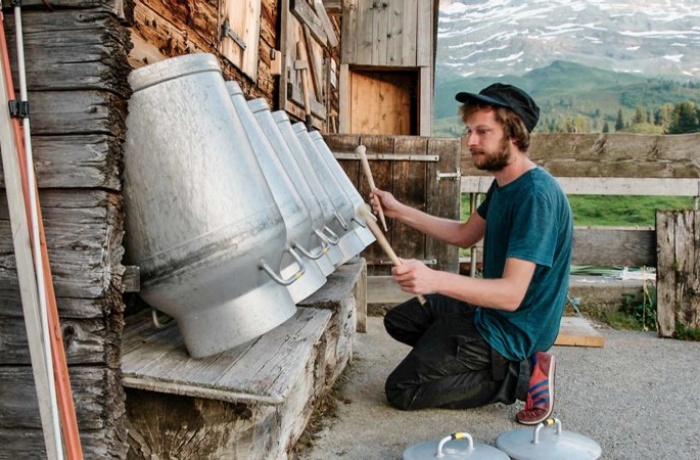
If you paid a visit to last year’s Docudays UA, you may be experiencing some flashbacks – Under the Sun by Vitaliy Manskiy, followed by Liberation Day by directors Uģis Olte and Morten Traavik, a film about the first Western rock concert in North Korea; but instead of Roman Bondarchuk’s bold Ukrainian Sheriffs you’ll see charismatic young musicians from the Kherson orchestra Dixie Land.
The third musical film that was included into the programme DOCU/ART, Melody of Noise by the Swiss director Gitta Gsell, will remind you of a feature hit from 2010, Sound of Noise, about a ‘terrorist’ group of drummers who use all kinds of junk they find on the street as musical instruments, and plan to take over their city with a never-before-heard work of art. Melody, however, is about real people for whom creating strange sounds out of their immediate environment is their lives’ calling, their philosophy, an exciting game where each new discovery, such as a creak of the garden gate or a clatter of coins against the surface of a ceramic pot, adds excitement and adrenaline to their blood.
It is interesting to observe not only the merging of documentary films and music, but also how filmmakers depict time. The closing film Liberation Day manages to create a whole world in the period it was filmed; for six days, the Slovenian alternative rock band Laibach, under the leadership of the director and producer of the concert Morten Traavik, adapts to the stringent requirements and regulations of the authoritarian regime of North Korea – they make concessions, taking out uncomfortable tracks from the setlist or rejecting some radical visual solutions; they are not allowed to move freely and are literally held hostage by the regime. While building the stage, the members of the band (which, by the way, was banned in Russia because of their desecration of the Russian national anthem) argue that, despite numerous restrictions and censorship, the cultural exchange doesn’t really stop. And while on the border with South Korea the loudspeakers continue to spout anti-Communist propaganda amid constant gunfire, by the seventh day the viewers have to find answers to a number of relevant, especially for Ukraine, questions: where is the ethical boundary that determines which artists can perform in some countries and which cannot? Is all art political in nature? Do good intentions (like showing alternative values and attitudes) ultimately justify the means of realising them?
Roman Bondarchuk’s Dixie Land (programme DOCU/YOUTH) seems on the one hand to be unfinished or incomplete, while on the other it appears to be made in the spirit of French impressionism, with life cycles and human development unfolding right there on the screen. For example, when a little kid suddenly transforms into a teenager or an adult, and begins to consciously take responsibility for their decisions – like Roman, who goes to recitals to a music boarding school in Kharkiv and keeps living through the same routine day in, day out: “Who ever said that it would be fun? Everybody goes through this. Why am I supposed to be different? I don’t think I am.” Dixie Land is a story about a children’s orchestra, founded by Semyon Ryvkin in Kherson after his return from World War II. Now, the film does not tell us where the man’s love of music comes from or how he chose the kids for his orchestra – the viewer does not receive any clues on this; but after hearing their performances and a few of Semyon Mykolayovych’s quips, we get a sense of the commitment he puts into building relationships with his students and carefully honing their talents. This is a film about human generosity, in which time is a spacious canvas.
In Melody of Noise time takes on a different form. It freezes in the moment when all human senses shut off, except for perfect hearing. This group of enthusiasts with a wide musical background does not restrict itself to traditional instruments and computer programs. They walk through the streets, forests and lawns; they go to garbage dumps, visit small homeware shops, and on their way they touch every object or piece of matter that may potentially produce sound. Sometimes they resort to combining different objects to discover their special sound. When they eventually discover the ideal sound or its natural vibe, they incorporate it into a more complicated composition – for example, one that seamlessly blends with the patter of rain which started when the track was created. This inevitably reminds us of Depeche Mode, Nine Inch Nails, Sigur Rós or Björk, each of whom has sought either an industrial, metallic or a natural, cosmic sound.
Whether these expeditions have value in the larger development of modern musical process is unclear. Live performance often results in audiences laughing their hearts out. The virtuosity of the musicians playing on drum kits made of garbage cans, tubes and other junk is genuinely entertaining and delights festival-goers in China, but the most important thing in this story is how the weirdest people, who don’t care about age or any other restrictions, create niches for themselves and fill them with meaning.
Text: Dasha Stokoz
Photo: "Melody of Noise" (dir. Gitta Gsell)